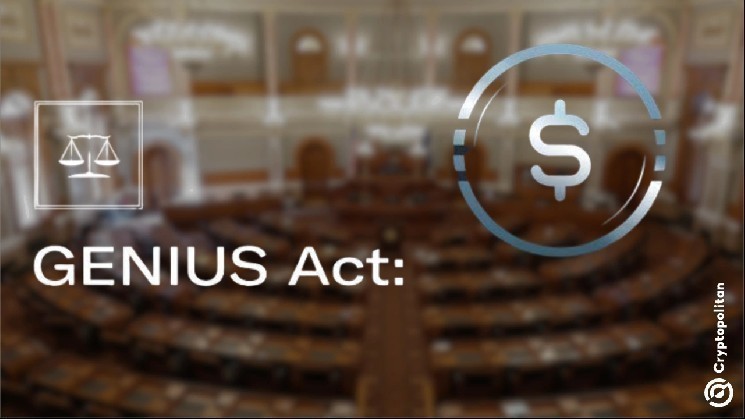According to Eleanor Terrett, more than 60 amendments to the GENIUS Act have been floated so far, and Senate Republicans and Democrats are now in the process of reducing that list to a more manageable number.
If they are able to reach a deal, Terrett says the bill could see the Senate floor before the end of the week. Otherwise, procedural hurdles will likely slow things down and push potential final passage into next week.
🚨NEW: The updated text of @SenatorHagerty’s stablecoin bill – the GENIUS ACT – has dropped.
Skimming through the PDF and noticed the section on ‘Reciprocity for Payment Stablecoins Issued in Overseas Jurisdictions’ has been expanded beyond the February text to include “reserve… pic.twitter.com/b1sdfgs9C5
— Eleanor Terrett (@EleanorTerrett) March 10, 2025
GENIUS Act negotiations are heating up in the Senate
According to sources familiar with the proceedings, sponsors of the GENIUS bill are working to reach a unanimous consent agreement that would allow for votes on a series of amendments without going through the full cloture process.
Such a package would include the bipartisan stablecoin framework and could also incorporate several related proposals.
Some include new disclosure requirements for government officials holding stablecoins (a priority for Democratic Sen. Adam Schiff of California); a ban on Chinese and foreign adversary ownership of stablecoin issuers (pushed by Republican Sen. Tommy Tuberville of Alabama); and reforms to the Bank Secrecy Act and anti-money laundering rules, backed by Republican Sen. Mike Lee of Utah.
The top Democrat on the Senate Banking Committee, Sen. Elizabeth Warren, is also expected to push for some amendments.
However, the biggest one to watch out for might be the Credit Card Competition Act from Sens. Roger Marshall (R-KS) and Dick Durbin (D-IL) — a controversial measure strongly opposed by banks and card networks that could reshape the credit card industry by forcing greater competition among payment processors.
Marshall is reportedly adamant about having a vote, which could potentially derail a broader agreement. Meanwhile, Sen. Thom Tillis of North Carolina has already stated that he would withdraw his support for the GENIUS Act if the CCCA is attached.
Like Terrett pointed out, if all sides reach an agreement, the Senate could move quickly — with votes on the bipartisan deal and other amendments, followed by limited debate and final passage of the GENIUS Act potentially before the end of the week.
But if no agreement is reached, the final passage could be pushed into the week of June 9. Since it is the upper chamber, timelines can shift quickly if there’s unanimous consent, but as things stand, Senate staffers say the path forward remains “fluid.”
Stablecoin legislation delaying Wall Street giants from pumping billions into crypto
If the GENIUS Act is finally signed into law, it would establish a framework for legally issuing stablecoins in the United States.
Stablecoins, crypto tokens generally pegged to the U.S. dollar, allow holders to enter and exit digital asset trades without accessing fiat currencies directly. They are also useful in sending payments and remittances across borders.
Many anticipate that the moment a stablecoin legislation passes, once-hesitant Wall Street giants will flood the sector, bringing billions of dollars, if not trillions, into crypto with them.
According to a new poll from the nonprofit Cedar Innovation Foundation, linked to the Fairshake super PAC, pressure is mounting on lawmakers to move quickly on crypto legislation.
The survey of 1,825 registered voters across 20 highly competitive Congressional districts, conducted by Change Research, shows overwhelming support for Congress to enact new laws tailored specifically to digital assets.
The poll saw 58% of voters say existing financial regulations don’t cut it when it comes to crypto, with just 15% thinking current laws (meant for stocks and bonds) are appropriate.
Meanwhile, 74% want Congress to create “clear rules of the road” that both protect consumers and encourage innovation, while 61% support new federal crypto laws, with support across party lines.
The poll covered districts like CA-45, NY-03, TX-34, and VA-07, signaling the possibility of lawmakers in tight races to feel the heat from constituents who want clarity on crypto.
CIF spokesman Josh Vlasto tagged the findings ”a clear mandate” and warned that the momentum from the 2024 election hasn’t faded.
“With strong support from Democrats, and key constituencies like young men and voters of color, these results demonstrate the feeling across the country and on Capitol Hill that this issue isn’t unique, but is a top concern for many Americans,” he said. “Congress needs to act now.”
Read the full article here

